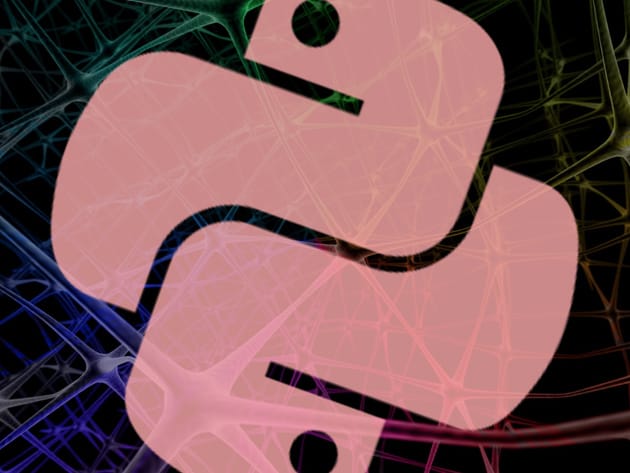Tag Archive: Advanced
November 29, 2016 / by Marco / Advanced, Artificial, Business', deals, Deep, design, entrepreneur, guide, intelligence, Learning, website

The Advanced Guide to Deep Learning and Artificial Intelligence for $42

KEY FEATURES
In this course, intended to expand upon your knowledge of neural networks and deep learning, you’ll harness these concepts for computer vision using convolutional neural networks. Going in-depth on the concept of convolution, you’ll discover its wide range of applications, from generating image effects to modeling artificial organs.
- Access 25 lectures & 3 hours of content 24/7
- Explore the StreetView House Number (SVHN) dataset using convolutional neural networks (CNNs)
- Build convolutional filters that can be applied to audio or imaging
- Extend deep neural networks w/ just a few functions
- Test CNNs written in both Theano & TensorFlow
Note: we strongly recommend taking The Deep Learning & Artificial Intelligence Introductory Bundle before this course.
PRODUCT SPECS
Details & Requirements
- Length of time users can access this course: lifetime
- Access options: web streaming, mobile streaming
- Certification of completion not included
- Redemption deadline: redeem your code within 30 days of purchase
- Experience level required: all levels, but you must have some knowledge of calculus, linear algebra, probability, Python, Numpy, and be able to write a feedforward neural network in Theano and TensorFlow.
- All code for this course is available for download here, in the directory cnn_class
Compatibility
- Internet required
THE EXPERT
The Lazy Programmer is a data scientist, big data engineer, and full stack software engineer. For his master’s thesis he worked on brain-computer interfaces using machine learning. These assist non-verbal and non-mobile persons to communicate with their family and caregivers.
He has worked in online advertising and digital media as both a data scientist and big data engineer, and built various high-throughput web services around said data. He has created new big data pipelines using Hadoop/Pig/MapReduce, and created machine learning models to predict click-through rate, news feed recommender systems using linear regression, Bayesian Bandits, and collaborative filtering and validated the results using A/B testing.
He has taught undergraduate and graduate students in data science, statistics, machine learning, algorithms, calculus, computer graphics, and physics for students attending universities such as Columbia University, NYU, Humber College, and The New School.
Multiple businesses have benefitted from his web programming expertise. He does all the backend (server), frontend (HTML/JS/CSS), and operations/deployment work. Some of the technologies he has used are: Python, Ruby/Rails, PHP, Bootstrap, jQuery (Javascript), Backbone, and Angular. For storage/databases he has used MySQL, Postgres, Redis, MongoDB, and more.

KEY FEATURES
In this course, you’ll dig deep into deep learning, discussing principal components analysis and a popular nonlinear dimensionality reduction technique known as t-distributed stochastic neighbor embedding (t-SNE). From there you’ll learn about a special type of unsupervised neural network called the autoencoder, understanding how to link many together to get a better performance out of deep neural networks.
- Access 30 lectures & 3 hours of content 24/7
- Discuss restricted Boltzmann machines (RBMs) & how to pretrain supervised deep neural networks
- Learn about Gibbs sampling
- Use PCA & t-SNE on features learned by autoencoders & RBMs
- Understand the most modern deep learning developments
PRODUCT SPECS
Details & Requirements
- Length of time users can access this course: lifetime
- Access options: web streaming, mobile streaming
- Certification of completion not included
- Redemption deadline: redeem your code within 30 days of purchase
- Experience level required: intermediate, but you must have some knowledge of calculus, linear algebra, probability, Python, Numpy, and be able to write a feedforward neural network in Theano and TensorFlow.
- All code for this course is available for download here, in the directory unsupervised_class2
Compatibility
- Internet required
THE EXPERT
The Lazy Programmer is a data scientist, big data engineer, and full stack software engineer. For his master’s thesis he worked on brain-computer interfaces using machine learning. These assist non-verbal and non-mobile persons to communicate with their family and caregivers.
He has worked in online advertising and digital media as both a data scientist and big data engineer, and built various high-throughput web services around said data. He has created new big data pipelines using Hadoop/Pig/MapReduce, and created machine learning models to predict click-through rate, news feed recommender systems using linear regression, Bayesian Bandits, and collaborative filtering and validated the results using A/B testing.
He has taught undergraduate and graduate students in data science, statistics, machine learning, algorithms, calculus, computer graphics, and physics for students attending universities such as Columbia University, NYU, Humber College, and The New School.
Multiple businesses have benefitted from his web programming expertise. He does all the backend (server), frontend (HTML/JS/CSS), and operations/deployment work. Some of the technologies he has used are: Python, Ruby/Rails, PHP, Bootstrap, jQuery (Javascript), Backbone, and Angular. For storage/databases he has used MySQL, Postgres, Redis, MongoDB, and more.

KEY FEATURES
A recurrent neural network is a class of artificial neural network where connections form a directed cycle, using their internal memory to process arbitrary sequences of inputs. This makes them capable of tasks like handwriting and speech recognition. In this course, you’ll explore this extremely expressive facet of deep learning and get up to speed on this revolutionary new advance.
- Access 32 lectures & 4 hours of content 24/7
- Get introduced to the Simple Recurrent Unit, also known as the Elman unit
- Extend the XOR problem as a parity problem
- Explore language modeling
- Learn Word2Vec to create word vectors or word embeddings
- Look at the long short-term memory unit (LSTM), & gated recurrent unit (GRU)
- Apply what you learn to practical problems like learning a language model from Wikipedia data
PRODUCT SPECS
Details & Requirements
- Length of time users can access this course: lifetime
- Access options: web streaming, mobile streaming
- Certification of completion not included
- Redemption deadline: redeem your code within 30 days of purchase
- Experience level required: all levels, but you must have some knowledge of calculus, linear algebra, probability, Python, Numpy, and be able to write a feedforward neural network in Theano and TensorFlow.
- All code for this course is available for download here, in the directory rnn_class
Compatibility
- Internet required
THE EXPERT
The Lazy Programmer is a data scientist, big data engineer, and full stack software engineer. For his master’s thesis he worked on brain-computer interfaces using machine learning. These assist non-verbal and non-mobile persons to communicate with their family and caregivers.
He has worked in online advertising and digital media as both a data scientist and big data engineer, and built various high-throughput web services around said data. He has created new big data pipelines using Hadoop/Pig/MapReduce, and created machine learning models to predict click-through rate, news feed recommender systems using linear regression, Bayesian Bandits, and collaborative filtering and validated the results using A/B testing.
He has taught undergraduate and graduate students in data science, statistics, machine learning, algorithms, calculus, computer graphics, and physics for students attending universities such as Columbia University, NYU, Humber College, and The New School.
Multiple businesses have benefitted from his web programming expertise. He does all the backend (server), frontend (HTML/JS/CSS), and operations/deployment work. Some of the technologies he has used are: Python, Ruby/Rails, PHP, Bootstrap, jQuery (Javascript), Backbone, and Angular. For storage/databases he has used MySQL, Postgres, Redis, MongoDB, and more.

KEY FEATURES
In this course you’ll explore advanced natural language processing – the field of computer science and AI that concerns interactions between computer and human languages. Over the course you’ll learn four new NLP architectures and explore classic NLP problems like parts-of-speech tagging and named entity recognition, and use recurrent neural networks to solve them. By course’s end, you’ll have a firm grasp on natural language processing and its many applications.
- Access 40 lectures & 4.5 hours of content 24/7
- Discover Word2Vec & how it maps words to a vector space
- Explore GLoVe’s use of matrix factorization & how it contributes to recommendation systems
- Learn about recursive neural networks which will help solve the problem of negation in sentiment analysis
PRODUCT SPECS
Details & Requirements
- Length of time users can access this course: lifetime
- Access options: web streaming, mobile streaming
- Certification of completion not included
- Redemption deadline: redeem your code within 30 days of purchase
- Experience level required: advanced, but you must have some knowledge of calculus, linear algebra, probability, Python, Numpy, and be able to write a feedforward neural network in Theano and TensorFlow.
- All code for this course is available for download here, in the directory nlp_class2
Compatibility
- Internet required
THE EXPERT
The Lazy Programmer is a data scientist, big data engineer, and full stack software engineer. For his master’s thesis he worked on brain-computer interfaces using machine learning. These assist non-verbal and non-mobile persons to communicate with their family and caregivers.
He has worked in online advertising and digital media as both a data scientist and big data engineer, and built various high-throughput web services around said data. He has created new big data pipelines using Hadoop/Pig/MapReduce, and created machine learning models to predict click-through rate, news feed recommender systems using linear regression, Bayesian Bandits, and collaborative filtering and validated the results using A/B testing.
He has taught undergraduate and graduate students in data science, statistics, machine learning, algorithms, calculus, computer graphics, and physics for students attending universities such as Columbia University, NYU, Humber College, and The New School.
Multiple businesses have benefitted from his web programming expertise. He does all the backend (server), frontend (HTML/JS/CSS), and operations/deployment work. Some of the technologies he has used are: Python, Ruby/Rails, PHP, Bootstrap, jQuery (Javascript), Backbone, and Angular. For storage/databases he has used MySQL, Postgres, Redis, MongoDB, and more.

Gunnar Optiks Intercept Advanced Computer Glasses for $64



KEY FEATURES
Recent research has found that nearly 70% of American adults experience some form of digital eye strain due to prolonged use of electronic devices. Whether you’re a dedicated gamer, TV viewer, or spend most of the day working at a computer, these glasses are designed to offer your eyes some relief. With a retro classic frame, the Intercept Computer Glasses are the crossroads of style and science.
- Ergonomically balanced frame supports precision optics
- Engineering grade injection polymers help to reduce headache, dry eye, blurred vision & eye strain
- Curved nose rests comfortably fit the glasses for long periods of time
- Rigid lens mounting reduces strain on eyes
- Polished logo plates create low-key accents to infuse a sense of sophistication
PRODUCT SPECS
Details & Requirements
- Material: Nylon polymer
- Lens width: 58mm
- Nose: 17mm
- Front width: 136mm
- Temple: 135mm
- Weight: 35g
- Frame color: Smoke
- Type: Gaming
- Wide fit
Includes
- PPK Glasses
Gunnar Optiks PPK Advanced Computer Glasses for $49



KEY FEATURES
Recent research has found that nearly 70% of American adults experience some form of digital eye strain due to prolonged use of electronic devices. Designed specifically with gaming in mind, PPK Computer Glasses are the smooth, precision tool to endure long sessions with minimal eye strain. Not a gamer? These are great in front of your work computer, too.
- Adjustable silicone nose pads will fit any face
- High tensile steel construction allows flexibility w/o surrendering toughness & durability
- Gently curved, ultra-slim temples form to your face comfortably
- Gunnar’s i-AMP lens technology reduces eye strain from digital screens
- One piece front construction prevents deconstruction
This is for the Gunnar Optik’s PPK Advanced Computer Glasses in Onyx. To purchase in Snow, view drop-down above!
PRODUCT SPECS
Details & Requirements
- Material: Stainless steel
- Lens width: 57mm
- Nose: 20mm
- Front width: 137mm
- Temple: 130mm
- Weight: 25g
- Type: Gaming
- Color: Onyx
- Wide fit
- Adjustable nose pads
- Headset compatible
- Interchangeable temples
